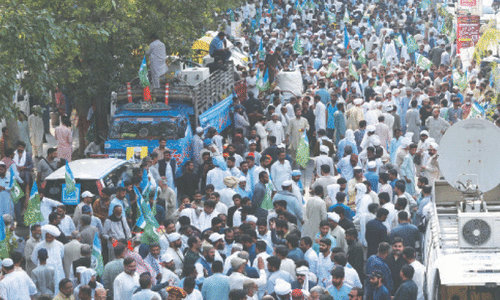LAHORE: The Punjab government has finally “found” serious problems in the traffic warden service in five big cities and intends to resolve them by inducting staff junior to them initially in Sialkot, Dawn learnt.
The rest of the districts have a separate and traditional traffic police system which too is replete with problems.
Sources say the major problem is the wardens’ poor career progression. And they will themselves block the promotion prospects of the new recruits if they are not promoted to the higher ranks they were promised.
The background of the “realisation” of the issues of the traffic wardens system and that in the small cities is stated to be the government’s desire to ensure smooth flow of traffic on roads which it is widening and remodeling mainly in Lahore.
The wardens service was raised in 2006-07 in five city districts of Punjab including Lahore, Rawalpindi, Gujranwala, Faisalabad and Multan. The irony is that the wardens are not considered police officers as yet.
The realisation is that the wardens have poor career progression. They are 6,850 but there are just 500 posts in the next higher grade (senior traffic wardens). Owing to this, just one out of 16 wardens will get promotion, and majority will retire in their present rank in which they were employed.
Another realisation is that wardens do not work because there is no chain of command, and there is no junior officials under them. They all perform point duty, and work as patrol, ticketing and administrative officers.
PSP officers are posted to high slots; set-up in small dists is replete with problems
They are of equal rank and do not, therefore, coordinate when posted at a single duty point. The patrolling officers do not mark absence of a missing colleague because they are of the same rank.
There are no proper traffic sector offices. No portion of traffic fine is given to the wardens as an incentive. They are given normal TA/DA despite the fact they are working in big cities where such allowance is special.
Traffic wardens are officers but they manually regulate traffic which is done by a traffic constable in 31 small districts.
They have not undergone proper basic training of traffic management and in-service training. They were given just six-month training without major required courses. They are city-specific and cannot be transferred to another city. They lack proper equipment and traffic management is through excessive deployment wherever required.
Now, the proposal is to recruit 170 wardens in Grade 9 which is equivalent to the rank of ASI and 400 in Grade 5 which is equivalent to the rank of constable.
Sources say this staff will also face the dilemma of lack of promotions like the traffic wardens. This issue can be solved only after promoting traffic wardens and vacating their posts for the new staff.
There are just 500 posts of senior traffic wardens and 34 of traffic officers, and even if these are filled through promotions, most of the traffic wardens will continue to serve in their present rank till they are retired from service.
As per the original plan, traffic wardens were to be promoted up to the rank of chief traffic officers. But so far none of them has been able to climb the first two steps and the highest posts are being manned by PSP officers.
The traffic system is different in the rest of the 31 districts in Punjab. This system is headed by the additional IG (traffic). This system too has major problems. There is no dedicated traffic training school for traffic police or drivers. There is no separate traffic police lines, offices, driving licence complex and document returning centres. Transport, communication and specialised equipment is inadequate.
There is lack of coordination between allied traffic departments for the removal of encroachments, illegal halting points and parking and repair of faulty signals. The mass public transport system is insufficient.
“This shows why there is mass mismanagement of traffic in the entire Punjab, and why wardens do not deliver or are unable to deliver. Let’s hope something is done to provide relief to the travelling people,” an official said.
Published in Dawn March 8th , 2015
On a mobile phone? Get the Dawn Mobile App: Apple Store | Google Play













































